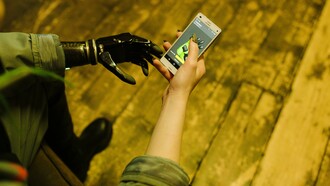The workweek is inevitably coming to an end. Everyone is quite exhausted and eagerly awaiting the weekend when they can finally get some sleep, wander around in their pajamas all day, not worry about work outfits, and only change for a leisurely walk with the dog. There's also the option to have a slow breakfast and casually scroll through news feeds and share funny Insta reels with friends and colleagues—like the one where a neural network-generated long-haired President Macron happily dances at a 1987 disco, flashing a single earring in his Macron-style ear, or where President Trump enthusiastically spins tracks as a DJ in a club next to Kim Jong Un, who, wearing an oversized t-shirt, asks the bartender for a cocktail made of life-giving liquid with a little kick.
On Saturday morning, it's very quiet outside. Only the yellow-billed thrushes lazily sing their morning songs, obviously sharing the latest news from the bird world among their community. I really love these rare quiet hours when there’s no sound of neighbors chatting, no cars rushing by—time seems to freeze, like golden caramel for a praline, something I adored in my childhood.
Out of the corner of my eye, I notice an unread message in my inbox—a platform where I collaborate as an AI trainer has informed me about a new project for my native language. For it, I need to undergo the appropriate training (a custom "tailoring" for each project), certification (where a certain score threshold must be met), and watch additional explanatory video sessions with quad managers1 and attempters2 from around the globe.
While my teenage son sprawls across the bed like a baby, having watched his favorite Real Madrid football match the night before, I brew myself a strong cup of coffee. The aroma of freshly ground beans slowly brings me back to life. I glance out the window where, for nearly a month, the sky has been relentlessly pouring gray rain, as if my house, like Dorothy's3, had been swept away by a furious storm from the center of the Iberian Peninsula and transported somewhere closer to the Scottish Isle of Skye.
I open the lid of my laptop with its softly glowing screen and begin the famous training.
The courses consist of dense theoretical and practical material, which requires hours of work to grasp its overall concept and understand the client’s requirements. Training over the weekend, when family members peacefully snore, drooling on their pillows, is quite the challenge. It demands tremendous willpower, as only that can drag you from the denial stage to the acceptance stage.
"We’re complicating the process of evaluating and training chatbots!" the developers joyfully flood my inbox. "The client demands real-life applicable tasks, work on requirements, and rewrite prompts if you can't achieve good results," they remind me daily.
Each task has a set amount of time, usually no more than 1.5 hours. The number of tasks per day is also limited because this type of work requires a huge mental effort. After all, using other resources (bots, platforms, etc.) is strictly forbidden—you’ll be unceremoniously kicked off the project and banned from collaborating in future projects.
I endlessly rewrite prompts, trying to "catch" the chatbot in a mistake or cognitive bias, rejoicing like a child when I manage to craft complex instructions. One task follows another, and in just an hour and a half, I’m moving from architectural subtypes of Soviet buildings from Khrushchev4's era to the classification of documents from the UN Water Convention. After that, I get up to stretch, quickly grab a cup of tea, and dive into another fascinating task—the model must find parallels between the philosophy of Rodnovery5 and quantum physics. Rather a daunting challenge, isn’t it?
I need to check the generated material for accuracy, style, and overall quality; point out errors; write a detailed explanation; and rewrite the chatbot's response if I find something inaccurate or bizarre.
I enjoy this job because of its novelty, but after several hours, I feel fatigue creeping in, and my head starts to feel heavy. Every now and then, I check the feedback section, where my completed tasks are randomly reviewed. Sometimes, I’m puzzled by the feedback I get, and sometimes I’m delighted that my efforts have not gone unnoticed by the reviewer.
Month after month, I watch as AI is getting smarter and developing unprecedented analytical skills, logical text construction, and information retrieval abilities. Its training becomes more challenging with each passing day.
Yet, as someone who has dedicated their entire life to languages, I still encounter ChatGPT’s robotized canned jokes, Gemini’s failed rhymes, Copilot’s awkward attempts at generating images of six-fingered people, and Claude’s imitation of Bradbury, Bunin, or Solzhenitsyn—those who have already been accomplished by humans. Since I’ve come across an enormous amount of content, I can quickly detect AI-generated text. What astounds me is how people continue to blindly trust the hastily crafted neural network texts without checking the facts or sensing the artificial style of the language.
The internet is full of headlines, articles, courses, and publications where the only author is the neural network, with the human contribution limited to crafting a somewhat competent prompt.
Working as a trainer for large language models, I increasingly face a moral dilemma—by passing on my knowledge in the process of their training, am I unknowingly contributing to humanity's eventual loss of its creative ability to create unique literary masterpieces that make readers ponder complex plots or empathize with protagonists, based on personal experience and judgment?
Will AI technologies, in the future, reach such heights in writing that they outpace their creators in producing authorial content that will move human souls and become part of mandatory school literature curricula? Will dazzling neon signs on Broadway advertise plays and musicals inspired by its works?
Can a neural network generate not an imitation of previously written books, but something unprecedentedly unique? Is self-awareness necessary for that? After all, self-awareness is an experience exclusive to humans—our personal experiences, emotions, feelings, judgments, and much more. It’s the human ability for self-reflection, awareness of our role in the world, and understanding that our perception of reality is limited by personal experience.
Every work of art is a thread woven into the fabric of human experience, and it is this thread, full of feelings, mistakes, and victories, that makes it unique. A neural network can weave according to patterns and templates, but it cannot create this intricate design from the millions of moments a human being lives through.
I continue working. Some tasks make me want to escape into the quiet of the early morning, while others are so captivating that I lose track of time. I don’t know what will come of it in the long term—whether we’ll teach AI to think better or simply adapt to their algorithms, and they to ours. Perhaps we are at the beginning of a journey where AI doesn't just copy but starts creating something new? But for now, I continue to believe that creativity, infused with human experience, remains something unique. Maybe this will all change in the future. Or maybe not.
But for now, we learn from each other. We—from them, they—from us.
And it seems I’ll have to brew another cup of coffee today.
References
1 A Quad Manager typically refers to a managerial role in a project or organizational setting, where the individual is responsible for overseeing and coordinating multiple facets of a particular initiative.
2 In the context of AI and large language models (LLMs), attemptters are individuals or roles specifically tasked with training or refining the models by providing feedback, corrections, and validation on outputs generated by the AI.
3 Dorothy Gale is the main character in L. Frank Baum’s 1900 novel The Wonderful Wizard of Oz.
4 Nikita Khrushchev (1894–1971) was a prominent Soviet statesman who served as the First Secretary of the Communist Party of the Soviet Union from 1953 to 1964.
5 Rodnovery (also known as Rodnoveryism or Rodnoverya) is a modern-day revival of Slavic folk religion and pre-Christian beliefs.















